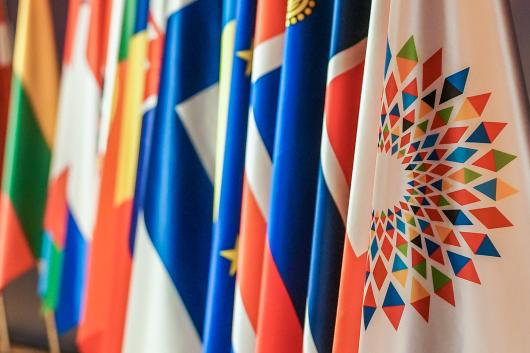
Achievements of the Czech Presidency - September
04.10.2022 / 13:00 | Aktualizováno: 05.10.2022 / 14:28
In September, the Czech Presidency focused mainly on issues related to the Russian invasion of Ukraine. Two extraordinary Energy Councils resulted in common European measures to address the energy crisis triggered by Russia's reduction of gas supplies to Europe. Highlights of the month included the provision of financial resources to Ukraine, the extension of anti-Russian sanctions and the suspension of an agreement that made it easier for Russians to obtain visas to travel to the EU. Czech diplomats also represented the EU Council at 13 trilogues. Ministers met in Brussels and in Prague for regular and informal meetings.
Mitigating the impact of energy prices
On the last day of September, energy ministers agreed on temporary measures to help reduce electricity prices for citizens and small and medium-sized enterprises. The agreement introduces a mandatory five percent reduction in peak electricity consumption, which will automatically lead to a price reduction. This is because there will be no need to use the most expensive source of electricity generation, which is currently natural gas. Member States have also agreed to cap the profits of low-cost electricity producers who benefit from the current high gas prices. Surplus profits will go to help households and small and medium-sized enterprises. A solidarity contribution from companies operating in the fossil fuel sector was introduced.
This package is the EU's concrete step to help Member States tackle the current energy crisis. The European Commission is expected to present further proposals to help citizens and businesses, including industry, in the near future. The Czech Presidency is then ready to continue with the fast pace of negotiations and to adopt further compromises that will reduce the impact of high energy prices on all EU citizens.
Further measures against Russia and financial assistance to Ukraine
EU foreign ministers had already agreed at an informal meeting in Prague at the end of August on the need to make it more difficult for Russians to obtain visas in EU Member States. The result was the suspension of the so-called visa facilitation agreement, which had made this process easier for Russian citizens. The suspension was formally confirmed by the Council of the EU on 9 September. In practice, this means that getting a visa to any EU country will now be more expensive and administratively challenging for Russians.
In mid-September, Member States agreed to extend sanctions against 1 206 Russian citizens and 108 entities for another six months. These include a complete ban on entry into the EU, freezing of assets and a ban on access to funds. The reason for the sanctions is Russia's continued aggression in Ukraine, with which these people, companies and organisations are associated.
The Czech Presidency was also the driving force behind the decision to provide further macro-financial assistance to Ukraine of EUR 5 billion in the form of heavily discounted long-term loans. This is another part of the EUR 9 billion package the EU pledged to Ukraine in May. The first billion was already approved by ministers in July, and the Presidency will continue to work to provide the remaining 3 billion as quickly as possible. The war-affected country will use the funds for the day-to-day running of the state, for example to ensure the running of offices, schools and hospitals.
Assistance to Ukraine was also high on the agenda of EU agriculture ministers, who were joined in person by their Ukrainian counterpart Mykola Solskyi. The ministers discussed not only the results of agricultural production, but also improving the export capacity of Ukrainian agricultural production, especially cereals.
September in numbers
5
Councils in Brussels
5
Informal Councils in Prague
17
Ambassadors' meetings
13
Trilogues
6
Presentations of priorities to the European Parliament
341
Working group meetings
Trilogues dominated by proposals from the Fit For 55 package
The Czech Republic, as the country holding the presidency of the Council of the EU, opened negotiations with the European Parliament on a number of legislative proposals. Most of these proposals fall within the Fit for 55 package, which aims to reduce greenhouse gas emissions in the EU by 55 percent by 2030. At the Council level, countries only reached agreement on the climate part of the package at the end of June, which is why most of the trilogues were opening trilogues. Thus, the first trilogues took place on land use and forestry emissions, on carbon dioxide emission standards for cars and vans, and on the revision of the aviation emissions trading system.
A political agreement was reached at the opening trilogue on the regulation on the restriction of access to Union waters. The Czech Presidency agreed with the European Parliament to extend this regime for another ten years, which will ensure stability and continuity in the fisheries sector.
Other trilogues were held, for example on the regulation of European long-term investment funds, on European political parties and foundations, on deforestation, on consumer credit and on general product safety. Follow-up trilogues are currently being planned to allow negotiations to continue, with some expected to result in a political agreement in the coming months.
Informal Councils in Prague
The series of informal Councils continued in Prague. The September meetings brought together consecutively the ministers responsible for cohesion policy, health, finance, consumer protection and agriculture. They discussed topics that they will also address in the coming months at formal meetings in Brussels or Luxembourg. These included the economic consequences of Russia's military aggression against Ukraine, the implementation of Europe's Beating Cancer Plan, and food security.




